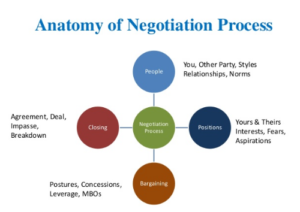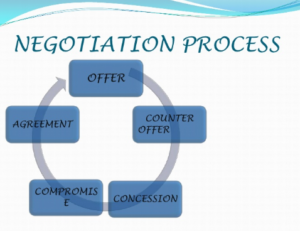How are your negotiation skills? Most negotiation secrets are a lost art as few modern Americans remain skilled at negotiating. We see a price and expect to pay that amount, with the exception perhaps of negotiating for automobiles and homes. However, we must avoid the cardinal sins of the negotiation process.

Look, I’ll be honest.
Even if your proposal is clear to you, it’s probably too vague for someone who has never dealt with you.
People often say that “nothing succeeds like success,” and, to a certain extent, that’s true. Successful companies get good press, find it easier to win new business as well as procure and retain top talent.
However, with success also comes growth and that brings its own set of challenges, especially for young companies. Often, it sends promising new stars into a tailspin from which they never recover.
There are lots out there to advise companies on how to be successful, but very little about how to manage the growth success brings. I’ve spent most of my career building entrepreneurial companies, done several turnarounds after things went awry, and uncovered some common problems as well as some successful solutions.
Related material: How to Create the Best Leadership Accountability
This article is about what NOT to do — what I like to call the 14 deadly sins of the negotiation process.
Let me explain them with some useful examples.
Check out our thoughts on building innovation.
Overcome with pride
Negotiating is an art. Each side wants something and the goal is to find a middle ground. When entering into negotiations, you should have a clear picture of what you will and will not accept, but make sure it’s realistic.
No matter how perfect you are for a job, no hiring manager is going to respond well to a candidate who thinks they are above the process.
Negotiation process … lacking control
Don’t get caught up in the smaller details that don’t matter. These may not be worth quibbling over or worse, botching your negotiation. When you create your list of “wants”, make sure to highlight those that are critical and ones that would be nice but aren’t deal breakers.
Prioritizing what you need and being willing to concede on a few things you may just want could make a major difference in the outcome.
Negotiation process … showing emotions
Negotiations are not always going to go your way, and that can be a little frustrating. But it’s never an excuse to become angry. Anger will only make you think irrationally and is the quickest way to get yourself eliminated from consideration of a job. The best negotiators take nothing personally, and remain calm and collected through the entire process.
Emotions have a habit of undermining skill and clouding rational judgment. Negotiations can become heated, passionate, frustrating, boring. When you get emotional, your higher-order brain functions – such as logic, rational decision-making, and sound judgment – tend to shut down.
It’s OK to display some passion or excitement at the right time. So you must pay close attention.
But on the inside you are a homicide detective, investigative journalist, and psychiatrist, all rolled into one. Nerves of steel, sound judgment, logically and methodically taking yourself and your prospect through the negotiation with win-win as your destination – that mindset will serve you best.
Especially in the final stages of a negotiation, there are two deadly emotional traps we often set for ourselves. After you have negotiated for a long time, have invested yourself, your creativity and much effort into the deal, you may come to think of the deal as “your deal” or “your baby”.

From that point, it becomes really hard to kill, even if your baby has turned feral. Ringing the bell prematurely or pre-selling the deal to management can also entrap you.
Walking away or even a delay in delivery can now create a huge face issue for you.
If you are emotionally invested, wily counterparties will use emotional pressure to keep you in the deal and to extract last-minute concessions that may make you regret the deal in the cool light of day.
And who needs to regret a deal?
Stay objective and remain as emotionally uncommitted to the deal as you can. Regularly ask colleagues who are not involved in the deal for their feedback.
Bluffing, lying, and making threats you won’t execute
Your credibility is one of the most valuable assets you have as a negotiator. That credibility is hard won and easily lost. One of the fastest ways to lose your credibility is to make threats, which you then don’t have the authority or the courage to follow-through.
The other side will be wondering what else you don’t have authority to say and won’t believe you next time you use a sanction. Another way to demolish your credibility is by lying, misleading or by making promises you can’t or won’t honor.
Don’t blow your credibility. The other side needs to know that your sanctions and deadlines are hard and real.
Don’t put your credibility at risk. Play it straight and be firm on the issues. Only signal a potential sanction if you are prepared and authorized to impose it.
Not being truthful
When we are negotiating, there is money on the line, sometimes a significant amount. It’s important to remember that just because you did your homework and have a number in your head, it won’t always be possible to meet it.
That’s why defining your ZOPA (Zone of Possible Agreement: the maximum of the range from your competition and the minimum of your range) and BATNA (Best Alternative to a Negotiated Agreement: this is the threshold value that any acceptable agreement must exceed) is so important.
Even if the negotiation is going well, don’t get greedy. That is one of the worst actions you can take.
Stick with asking for numbers that are reasonable for your strategy.
Trying for perfection and win it all
There is always a better deal out there. Pushing on beyond what is already a good deal exposes you to danger and the law of diminishing returns.
As a negotiator, you need to know what a good deal looks like and when to shake on a good deal. The secret is careful preparation. We observe this in negotiations a lot: greed takes over and the temptation to push for just one more concession.
Sometimes you get away with it: sometimes it’s that last demand that collapses the entire deal and causes resentment you’ll be reminded of for years. Don’t chase the last dollar, chase the next profitable deal instead.
Prepare carefully, know exactly what you want and don’t risk a perfectly good deal in pursuit of a perfect one.
Unaware of your limits
Decide beforehand what your absolute minimum outcome is, and do not be afraid to leave the negotiations if you cannot get it.
Knowing everything

People expect you to counter their first offer. Imagine someone has advertised a car for $15,000. You offer them $8,000 and they say: “sold”.
How would you feel? You’d probably think: “Damn, I should have started with $6,000.”
Your second thought might be: “There’s something wrong with this car.”
Similarly, the other side will realize that you would probably have been happy to pay more. Taking the first offer is an easy way to ensure that both sides will regret the deal.
Always work to improve on a first offer. Both parties will be happier!
Not stating what you want
The best way to ensure that you don’t get what you want is to keep the other side guessing about what you want. The sooner both sides clearly tell each other what they need, the sooner both sides can start working on a deal that will work.
It’s so simple, yet there is a strong tendency in business to keep much of the available information hidden. Skilled negotiators know what to disclose and what to hold back. This is a vital balance because information is at the core of good deals.
In our experience, poor and insufficient information disclosure is the most common cause of deal failure. I’ve made that mistake a few times, how about you?
Talking too much
Too much information confuses people, and confused minds always say no. Learn to ask a question and then be quiet.
Enough said.
Lacking patience
Never give clients the bottom line anywhere near the beginning Making clients wait a few hours to get close to a legitimate deal gets them a little frustrated, making them want what you’re after even more, and puts you in control. It also accomplishes three other goals:
Since it took so long, the impression is that there must be a lot of thought, knowledge, and research behind.
It is in writing, which makes it more solid, and truer like there is nothing else really to discuss.
It makes them want your product or services more.
Not listening
Watch the body language closely. Read what isn’t being said.
Negotiations are often emotional, so taking the time to acknowledge your counterpart’s feelings, rather than minimizing them, can help bring things into balance.
Paraphrase what was said, reflecting the last few words, asking open-ended questions to provide further insight, and encouraging by giving a head nod or saying “I see.”
Try to listen more than you speak; utilize silence and pausing; and build rapport and trust, which can lead to a better agreement.
Body language can affect the way information is received and presented. Fidgeting, nail-biting or twitching can indicate nervousness or lack of confidence. It could also distract others from what you’re trying to say.
Not negotiating in person
People are more connected to their phones and computers than ever, making it hard even to get them to meet in person. But it will be more effective when you do.
A great negotiator, when needed, uses his emotions, family, heritage, spirituality, body language, fashion, sexuality, humor, and everything else in between to win, to make a deal happen.
However, if the phone is your only option, note the importance of having an agenda, knowing what you want out of the call before making it, and using few words.
Losing your cool
If negotiations become argumentative, walk away and “take five” to reassess your situation. If the other party is not willing to come to an acceptable compromise, consider whether it is more beneficial for you to continue or to end the negotiations simply.
The bottom line
The ability to negotiate successfully whether in your business or personal life can make the difference between success and failure. Whether it’s buying a car, disputing credit card charges, or, partnering with another business, the basic principles of negotiation are the same.
Just remember that even the most skilled and experienced negotiators will feel discomfort when negotiating. The only difference is a skilled negotiator has learned to recognize and suppress those feelings.

Need some help in capturing more improvements for your staff’s leadership, teamwork, and collaboration? Creative ideas in running or facilitating a team or leadership workshop?
